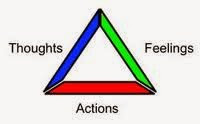Cognitive Behavioral Therapy (CBT) helps configure your brain for optimism, positivity and confidence. Since, thought is the basis of our reality, why not create thoughts that build a reality that encourages happiness, fun, and self-esteem? Brain science tells us that thought connects to an emotion, this emotion becomes an electrical synapse then the experience gets wired into your neural network. The more you fire certain thoughts or emotions, the stronger that circuit becomes. The more you focus on fear, pain, trauma, the stronger those circuit becomes. CBT reframes negative thoughts to positive one. Fortunately, generating positive thoughts builds that circuit. This process isn’t just figurative, it is literal. By that I mean, you actually “grow” neurons in your brain. The technical term for this is “Neuroplasticity.” In essence, the brain is “plastic” or pliable and can be restructured. There are very specific exercises and skills you can use to build these circuits.
Focus on the past, which you cannot change, fires the depression circuit. Focus on the future fires the anxiety circuit. Once anxiety kicks in, the problem worsens as people then begin to anticipate the anxiety, which makes the anxiety increase.
Focus on the past, which you cannot change, fires the depression circuit. Focus on the future fires the anxiety circuit. Once anxiety kicks in, the problem worsens as people then begin to anticipate the anxiety, which makes the anxiety increase.
 All we really have is the present. If you can stay mindful, present and positive, you can change your mood and improve confidence and wire in happiness and self-esteem. This process is more that just reciting affirmation, it is transforming your thinking. Write down the 5 or 6 most common negative thoughts that come to mind. Then, identify the feelings associated with those thoughts. Now, create a reframe of the negative thought by turning it around 180 degrees. Now, see what new emotion is generated. Practice these new reframed thoughts daily, until this new circuit replaces the automatic negative thought circuit.
All we really have is the present. If you can stay mindful, present and positive, you can change your mood and improve confidence and wire in happiness and self-esteem. This process is more that just reciting affirmation, it is transforming your thinking. Write down the 5 or 6 most common negative thoughts that come to mind. Then, identify the feelings associated with those thoughts. Now, create a reframe of the negative thought by turning it around 180 degrees. Now, see what new emotion is generated. Practice these new reframed thoughts daily, until this new circuit replaces the automatic negative thought circuit.



